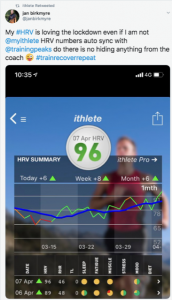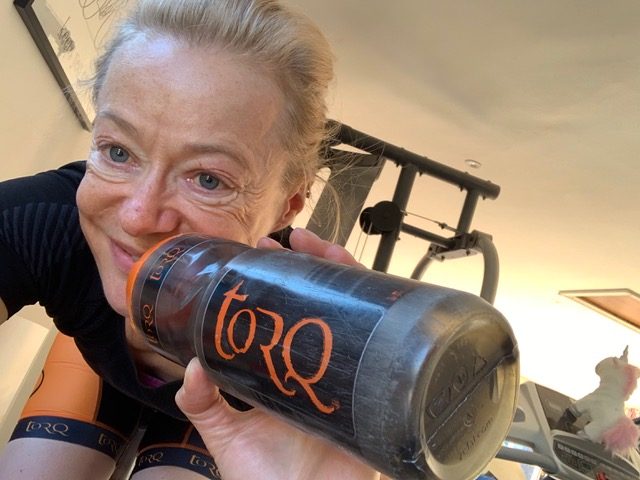
by Jan Birkmyre
According to my daily heart rate variability (HRV) readings from ithlete, it is very clear my body loves this lockdown. On reflection, I suppose, that should not come as a complete surprise but even so, the magnitude of the improvement is a shock.
Thanks to ithlete, I have been taking an HRV reading every morning for eight years now and over time I have learned a lot about what affects my health. The monitoring of subjective measures sleep, fatigue, muscle soreness, stress, mood and diet have really added to my understanding of what affects my ability to cope with training. Alongside hard data on training load from Garmin and sleep from Fitbit it all adds up to give me a lot of data to help understand and manage my health. Happily, I do not analyse that alone because it all synchs with Training Peaks so that my coach, Steve Cronshaw, can work his magic to get the best out of me as an athlete.

At the end of every race season we sit down and think about what we can do better in the future. Following a very difficult 2019 it was blindingly obvious that I needed to pay more attention to my health. While that is, of course, a very individual thing, I am sure the lifestyle stressors that affect me will be the same for many of us. For me, the quality and quantity of my sleep is clearly the most influential factor affecting my ability to cope with training, after that long hours in the car and stress or mental resilience are all measures I take time to record so that Steve can see the danger approaching. He knows now that he will need to adapt the training plan to allow me to recover from those, as well as the training stress itself, or I will most likely get ill or injured.
The relationship between these stressors, and how they add up is important and something we are continually learning from. If I were to think about how important each element is to my health overall it would look something like this, with the percentages indicating my feel for the impact each has:
- Sleep – 50% – this is easily the most important lifestyle factor and one I have invested in understanding. My “sleep hygiene” is now pretty good. However, I struggle with sleep at and before big events. The World Masters is six days of racing, the National Masters three and the lead up to those events, in particular, sees me over adrenalized and buzzing, as well as being rested from the taper which all adds up to compromised sleep patterns. Day to day I pay a lot of attention now to my sleep.
- Stress – 30% – mental stress from work and life (family, health, money) is also significant.
- Diet – 20% – I count this as a controllable, I have learned over time how important hydration is to my HRV reading. I usually pack my own food when travelling and always have plenty of water, so I don’t measure this daily, I just focus on doing it right.
- Fatigue – this is an output from training, plus 1, 2 and 3. Steve likes me to record this daily to keep an eye on how all of that is accumulating and when I might need an adaptation week.
- Muscle soreness – again this is an output but another one the coach likes me to record.
- Mood – again more of an output from life, rather than a controllable, but an important measure to understand where an athlete is in terms of coping with training and life. It is a difficult one to affect but my coach insists I record it as a window on my daily stress.
 So, 2020 was to be a year when I more consciously managed work, life and training stress and I had big plans to support my immune function. Little did I know that by mid-March a number of those plans would be out of my hands. As I write this, we are in week five of the lockdown and my sleep is dramatically better and stress from travel is non-existent. Before lockdown I would visit client sites in North Yorkshire, South Wales and London, pounding up and down the motorways and often requiring an overnight stay. Now I am sleeping in my own bed every night, with no need for an alarm, I wake naturally, and my sleep pattern has improved dramatically. And, of course, because I am at home, I can better plan my nutrition too.
So, 2020 was to be a year when I more consciously managed work, life and training stress and I had big plans to support my immune function. Little did I know that by mid-March a number of those plans would be out of my hands. As I write this, we are in week five of the lockdown and my sleep is dramatically better and stress from travel is non-existent. Before lockdown I would visit client sites in North Yorkshire, South Wales and London, pounding up and down the motorways and often requiring an overnight stay. Now I am sleeping in my own bed every night, with no need for an alarm, I wake naturally, and my sleep pattern has improved dramatically. And, of course, because I am at home, I can better plan my nutrition too.
I know that am one of the very lucky ones, I am locked down on a small farm in Worcestershire. There are fields around me and a quietness that we usually only experience at Christmas. The weather is glorious, and I have a home office and a gym. I am in denial about the possible impact on my business but for now, I am embracing the slower pace of life and my HRV readings reflect all of that. I am seeing numbers higher than ever before, despite pushing on with training and managing some PB’s in the gym and on the bike.
I don’t want to downplay the stress felt by those working tirelessly to help the sick, or the grief and loneliness experienced by so many others but for many of us, this enforced “down-time” is a time to stop and be grateful, to reflect and take stock, and for now at least my ithlete numbers tell me my health is benefiting.

A really useful article – thank you. I am using ithlete as part of my health monitoring rather than as a training guide but your summary of what impacts on your HRV is a really great start and ties in closely with other lists I have seen from medical practitioners (but yours is from real life so I trust it
more!)
I am about to write a blog on HRV monitoring for my nascent website and would love to be able to quote your article if that would be OK?). Thanks, Richard
Thanks for the feedback Richard. Yes, please do quote the article and mention the name of the author, Jan Birkmyre.
Best of luck with the website!